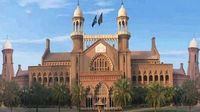LAHORE: The Lahore High Court (LHC) summoned Attorney General of Pakistan (AGP) Mansoor Usman Awan on April 8, 2025, regarding the ongoing ban on the social media platform X, formerly known as Twitter. This legal action follows a significant disruption of access to X that began on February 17, 2024, amid widespread protests sparked by allegations of vote rigging in the February 8 general elections.
The full bench of the LHC, led by Chief Justice Aalia Neelum, heard a plea challenging the suspension of X services in Pakistan. This case has garnered considerable attention, as rights groups and journalist organizations have condemned the government's actions, viewing them as an infringement on freedom of expression. The disruption is said to have caused significant losses for internet service providers as well.
NetBlocks, an organization that monitors internet accessibility, confirmed a "national-scale disruption" affecting X in the country, coinciding with the protests against alleged electoral fraud. The unrest was fueled by accusations from former Rawalpindi Commissioner Liaquat Chattha, who claimed that the Chief Election Commissioner and a top Supreme Court judge were involved in manipulating the election results.
During the hearing, the additional attorney general informed the court that a report had been submitted by the Pakistan Telecommunications Authority (PTA) regarding the ban. However, it became evident that the PTA and the federal government were not aligned on the rationale for X's shutdown. Advocate Azhar Siddique, representing the petitioners, pointedly remarked, "The PTA and the federal government are not on the same page on Twitter's [X] shutdown," highlighting the confusion surrounding the legal status of the ban.
Justice Neelum responded critically, stating, "There is no concept of one page in the court; you and the court are also not on the same page." This exchange underscored the lack of clarity and communication among the authorities involved in the case.
Justice Farooq Haider, another member of the bench, pressed for answers regarding the notification of the ban, asking, "What is the legal status of the notification of the ban on X?" The additional attorney general, Mirza Nasar Ahmed, replied that the PTA had submitted a report but did not clarify the legal grounds for the suspension.
Advocate Siddique further criticized the federal government's failure to provide a written response regarding the ban, questioning the grounds on which the PTA had acted. He noted that the court had previously requested a list of government officials using X, which had not been provided. In response, AAG Ahmed stated, "It is not possible for us to provide such a list," indicating a lack of transparency in the government's actions.
The LHC had previously given the federal government a final opportunity to resolve the issue, directing authorities to propose a solution and identify who would implement it. The court's insistence on clarity suggests a growing frustration with the government's handling of the situation.
The case has drawn international attention, with the United States urging Pakistan to lift restrictions on social media platforms. As the LHC prepares for the next hearing on April 17, 2025, the outcome remains uncertain, but the implications for freedom of speech and access to information in Pakistan are profound.
As the situation unfolds, many are watching closely to see how the government and judiciary will navigate the complex intersection of technology, politics, and civil liberties. The outcome of this legal battle could set significant precedents for digital rights in Pakistan.






